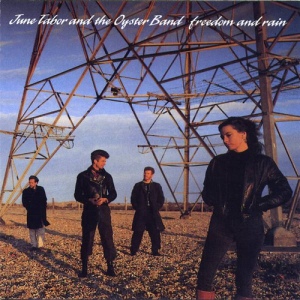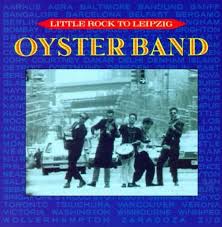From 1990, on the Cooking Vinyl label (COOKCD 031), Freedom and Rain was a collaboration between June Tabor and the Oyster Band. Although very well-received, it was a one-off project of an album and short tour (I was fortunate enough to catch them headlining at that year’s Cambridge Folk Festival) and it wasn’t until 2011 that they decided to do a follow-up (which I’ll write about shortly).
It was an inspired pairing though: By this time the Oyster Band had carved out their own distinctive instrumental take on English folk-rock (involving concertina and cello – which set them apart from others in the genre) and they benefited on this album from the assurance and strength of Tabor’s matchless voice. And on the other side of the equation, June Tabor, whose own work is usually characterised by spartan, restrained instrumentation benefited from having a fuller, richer mix – something she had begun to explore by guesting with Fairport Convention at their festival a couple of years earlier).
What makes this such a good album is the selection of material – just ten songs, three traditional and seven contemporary – most done quite fast.
The selection opens with ‘Mississippi Summer’, an unusual, brooding choice for musicians so closely associated with the music of the British Isles but which introduced me for the first time to the songwriting of Si Kahn.
Track two two is a melodeon-driven take of ‘Lullaby of London by the Pogues’ Shane MacGowan – perhaps a little to ‘jaunty’ for me although it does show McGowan’s songwriting skills to good effect.
The third selection is ‘Night Comes In’ which first appeared on Richard and Linda Thompson’s ‘Pour Down Like Silver’. Taken at a faster tempo than the original, this rocks out in a way that makes it a bit more accessible and it just about works since June Tabor’s interpretations Richard Thompson songs are always worth hearing.
Next up is a version of Billy Bragg’s ‘Valentine’s Day is Over’, where a female vocal (especially June’s) works better than a man’s (even the composer’s): “Thank you for the things you bought me/Thank you for the card/Thank you for the things you taught me when you hit me hard/Love between two people should be based on understanding/Until that’s true you’ll find your things all stacked out on the landing/Surprise, surprise Valentine’s Day is over” .
Track five is perhaps the most surprising cover, the Velvet Underground’s ‘All Tomorrow’s Parties’ by Lou Reed. This works remarkably well and is a highlight of the collection – with June Tabor’s imperious, austere, vocal surpassing Nico’s original from 1967, some great drumming from Russell Lax and what’s either a cello or a viola providing a drone-like backing. (This track is in the same vein as the Oyster’s earlier cover of New Order’s ‘Love Vigilantes’).
The first traditional song is ‘Dives and Lazarus’ – taken a swift pace which really rocks out and benefits from a cracking bass line from Chopper and a three-piece brass section. This version also contains the wonderfully weird descriptive lyric line line: “Hell is dark, Hell is deep, Hell is full of mice” that makes me smile whenever I hear it.
Track seven is another trad. song (‘Dark Eyed Sailor’) which is one of my favourites. I first heard this done by Steeleye Span and have another version interpreted by a very young Kathryn Roberts and Kate Rusby . All are wonderful – this version , again done at pace with a hard-rocking rhythm section.
The eighth track (‘Pain or Paradise;) sounds like it ought to be traditional but was written for the Albion Band by John Tams and issued as a single in 1979. Based on a sea-shanty (‘Riding on a Donkey) which I first learned at school, this features a double-tracked June Tabor vocal and (once again) a driving brass section. A great song.
‘Susie Clelland’ (aka ‘Lady Maisry’ or ‘The Burning’) is the final traditional song on the album (number 65 of the Child collection of ballads) and describes the fate of a Scottish lady who had the temerity to fall in love with an Englishman! The string arrangement works really well.
The collection closes with the only song by one of the performers – Ian Telfer. ‘Finisterre’ is a lovely, slow acoustic number with a wistful lyric and one of the few tracks where you can really hear Alan Prosser’s guitar work above the mix.
It tempting to speculate what might have been had these six musicians stayed together to build on this album’s success – and what might have happened if a major label had been there to give it a decent marketing push – but as it is, it’s still one of the top ten examples of Folk-Rock Britannica and well worth tracking down if you don’t know it.


